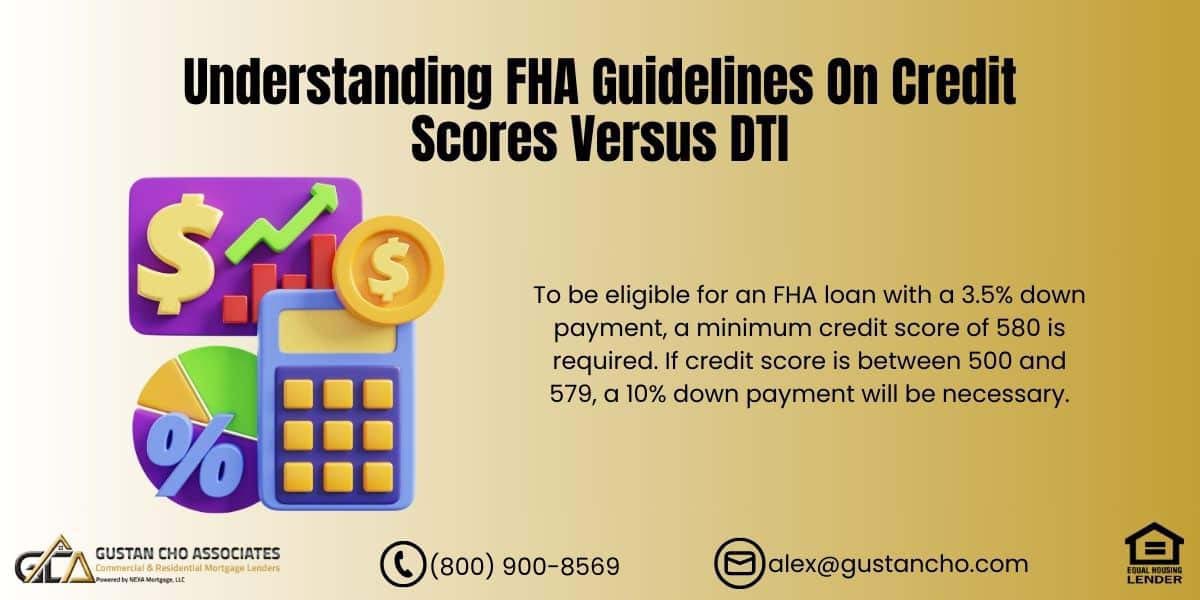If you’re thinking about getting a home with an FHA loan, it’s really important to know how your credit score and how much debt you have (that’s your debt-to-income ratio or DTI) can affect things. These factors matter a lot when you’re trying to get approved for a mortgage. We’re going to explain all about the FHA guidelines on credit scores versus DTI. So you have a clear idea of what you need to know.
Understanding FHA Guidelines on Credit Scores Versus DTI: A Guide for Borrowers
The Federal Housing Administration (FHA) is known for its borrower-friendly loan options. Making it easier for more people to own homes. When you’re applying for a loan, there are two big things that matter a lot – how good your credit score is and your debt-to-income ratio (DTI). Both of these play a huge role in determining if you get the loan and on what terms. Let’s explore how these factors play together and impact whether you can get that dream home.
Credit Score – This is a number that financial companies look at to decide how risky it is to lend you money. A higher score means you’re good at managing your debt and making payments on time. Which makes lenders more willing to give you a loan with better terms.
Debt-to-Income Ratio (DTI) – This is all about balancing how much money you owe versus how much money you make. It shows lenders whether you have enough income left after paying your monthly debts to afford a home loan. The lower your DTI, the better your chances are of getting approved.
The FHA guidelines on credit scores versus DTI offer a more relaxed approach compared to traditional loans. It gives more people the chance to buy a home. However, balancing a decent credit score with a manageable DTI is still important to securing an FHA loan. Understanding how these elements affect your loan options will better prepare you for the homebuying process.
Confused About FHA Credit Scores and DTI? Let Us Help You Understand the Guidelines!
Contact us today to learn how both factors impact your eligibility for an FHA loan and how we can help you qualify.
Credit Score Requirements
Your credit score is like a grade that shows how well you handle your money when applying for a home loan. FHA loans are a bit easier to get compared to the usual ones because they’re not as strict about your credit score. Here’s the breakdown:
- If you have a credit score of 580 or more, you’re in luck. To get an FHA loan, you only need to pay 3.5% of the house’s price upfront as a down payment.
- Have a score between 500 and 579? You’re still in the game, but you’ll need to pay more upfront – about 10% of the home’s price.
- If your score is under 500, then you’re out of luck for now. FHA loans won’t be an option.
The FHA guidelines on credit scores versus DTI are there to help more people own homes. The better your credit score, the better your chances of getting a good deal on a loan.
Debt-to-Income Ratio (DTI) Explained
When you’re trying to get a loan, lenders look at your debt-to-income ratio. They want to see if you can handle taking on more debt. This is about comparing what you owe each month to what you earn. There are two types of DTI:
- Front-End DTI: This one is all about your home costs like your mortgage, property taxes, and insurance, measured against your monthly income. According to FHA guidelines, your housing costs shouldn’t take up more than 46.9% of your income.
- Back-End DTI: This type looks at all your monthly debt payments. That means housing costs plus any car loans, credit card debt, and student loans – compared to your income. The FHA says all this together shouldn’t be more than 56.9% of your income.
About FHA guidelines on credit scores versus DTI – having a good credit score can make lenders more flexible with those DTI limits, letting you borrow a bit more.
The Relationship Between Credit Scores and DTI
Understanding how your credit score affects what you can borrow based on your DTI is important when getting an FHA loan. FHA guidelines on credit scores versus DTI show that if you have a good credit score, you can owe more compared to your income. Let’s break it down:
If your credit score is more than 620, you could borrow amounts that leave you with debts up to almost 47% of your income before taxes for your mortgage alone and about 57% for all your debts.
Now, if your credit score is under 620, things get tighter. Lenders might only allow your total debts to be up to 43% of your income for you to get the loan easily.
So, having a higher credit score gives you a bit more breathing room with how much debt you can have and still get an FHA loan.
The Importance of Credit Scores Versus DTI
Focus on maintaining good credit and managing your debt. Both elements are crucial when qualifying for an FHA loan as per FHA guidelines on credit scores versus DTI. Remember this especially if you have higher debt-to-income ratios. Let’s look at why these factors matter:
- Higher Credit Scores Enable Higher DTI Ratios: With a higher credit score, lenders are more likely to approve higher DTI ratios. This means you can have more debt relative to your income and still qualify for a loan.
- Lower Credit Scores Require Lower DTI Ratios: If your credit score is lower, you’ll need to maintain lower DTI ratios to qualify. This ensures you can manage your debts and monthly payments effectively.
Understanding FHA guidelines on credit scores versus DTI can help you plan and prepare better for your home purchase.
FHA Guidelines on Credit Scores Versus DTI Caps
To get an approve/eligible status per the automated underwriting system (AUS), your credit score and DTI ratios must align with FHA guidelines. Here’s a breakdown:
- Credit Scores 620 and Above: You can have a front-end DTI ratio of up to 46.9% and a back-end DTI ratio up to 56.9%.
- Credit Scores Below 620: Your DTI ratios need to be lower to get an automated approval, typically capped at a 43% DTI.
Lenders rely on the AUS to determine your eligibility. If the AUS gives an approve/eligible status, and you meet the required conditions, your loan is likely to close and fund. However, some lenders impose additional requirements, known as overlays, which can affect your approval.
Lender Overlays on Credit Scores and DTI Ratios
While FHA sets the baseline guidelines, some lenders may have overlays. These are additional criteria that go beyond FHA’s requirements. Here are common overlays related to credit scores and DTI ratios:
- Credit Score Overlays: Some lenders require a minimum credit score of 620, even though the FHA allows for scores as low as 580 with a 3.5% down payment.
- DTI Ratio Overlays: Lenders may cap DTI ratios at 45% or 50%, even if FHA allows up to 56.9% for borrowers with credit scores of 620 or higher.
These overlays vary by lender. It’s important to shop around for a lender with flexible guidelines.
Tips for Managing Your Credit Score and DTI Ratio
If you’re hoping to get approved for an FHA loan, it’s important to keep an eye on your credit score. You also need to see how much debt you have compared to your income. Here’s how to make your chances better:
- Boost Your Credit Score: Pay your bills on time, keep your credit card balances low, and try not to take on new debt. Check your credit report regularly for errors and correct them if you find any.
- Lower Your Debt-to-Income Ratio: You can do this by either making more money or paying off some of your existing debts. Try not to borrow more money right before you apply for a home loan.
- Pick a Lender That Fits: Some lenders are easier to work with or have rules that are more favorable for borrowers. Finding one can help you get your loan application through.
Knowing about FHA guidelines on credit scores versus DTI can really help you understand what’s important and work on improving your chance of being approved for an FHA loan.
FHA Guidelines on Credit Scores Versus DTI: Co-Borrowers
Including a co-borrower on your FHA loan can impact your eligibility and loan terms. Here’s what you need to know:
- Single Borrower: If you’re the sole borrower, only your credit score and DTI ratio are considered.
- Co-Borrowers: When there are multiple borrowers, the lower middle credit score of all borrowers is used. For example, if one borrower has a middle score of 750 and the other has 600, the 600 score will be considered.
Including a co-borrower with a lower credit score can reduce your maximum allowable DTI ratio. If one borrower’s income is sufficient, it might be better to exclude the lower-scoring co-borrower from the loan application to benefit from higher DTI limits and better loan terms.
Worried About Your Credit Score or DTI? FHA Guidelines Make It Easier to Qualify!
Reach out now to discuss how your credit score and DTI can affect your FHA loan approval.
Example Scenario: John and Mary Smith
Let’s consider a scenario involving John and Mary Smith to illustrate how FHA guidelines on credit scores versus DTI apply:
- John’s Credit Scores: 700 (Experian), 750 (TransUnion), 800 (Equifax)
- Mary’s Credit Scores: 550 (Experian), 600 (TransUnion), 650 (Equifax)
John’s middle score is 750, and Mary’s middle score is 600. If John alone qualifies for the loan, he benefits from his higher credit score. This will potentially allow a DTI ratio up to 56.9%. If Mary is added to the loan, the 600 score is used, and the DTI ratio is capped at 43%.
In this case, it’s advantageous for John to apply alone, keeping Mary off the mortgage. Mary can still be on the title without affecting the loan terms.
Final Thoughts on FHA Guidelines on Credit Scores Versus DTI
Understanding the FHA guidelines on credit scores versus DTI is essential for anyone considering an FHA loan. These guidelines help determine your eligibility and the terms of your mortgage. Remember:
- Credit Scores and DTI Ratios Are Interconnected: Higher credit scores allow for higher DTI ratios.
- Lender Overlays Can Impact Approval: Shop around for lenders with flexible guidelines.
- Manage Both Credit and DTI: Improving your credit score and managing your debt effectively can enhance your loan eligibility.
Use this guide to help you through the process of purchasing a home and make well-informed decisions. Understanding FHA guidelines on credit scores versus DTI can help you achieve your homeownership goals in 2024.
Stay informed and proactive to improve your chances of getting approved for a mortgage and getting closer to owning your dream home.
FAQs: Understanding FHA Guidelines On Credit Scores Versus DTI
- 1. What is the minimum credit score for an FHA loan? To be eligible for an FHA loan with a 3.5% down payment, a minimum credit score of 580 is required. If credit score is between 500 and 579, a 10% down payment will be necessary.
- 2. What does DTI stand for in mortgage terms? Your debt-to-income ratio (DTI) is the result of comparing your total monthly income to your monthly debt payments. This helps determine your ability to afford a mortgage.
- 3. How does a higher credit score affect my DTI ratio for an FHA loan? According to FHA guidelines on credit scores versus DTI, a higher credit score allows for a higher DTI ratio. This means you can have more debt relative to your income and still qualify for a loan.
- 4. What is the maximum DTI ratio allowed by FHA? Borrowers with credit scores 620 or higher can have a front-end DTI ratio of up to 46.9% and a back-end DTI ratio of up to 56.9% as per the FHA guidelines.
- 5. Can I get an FHA loan if my credit score is below 500? No, if your credit score is below 500, you cannot qualify for an FHA loan.
- 6. How do lenders use the Automated Underwriting System (AUS)? Lenders use the AUS to determine if you qualify for a loan. The system gives an approve/eligible status based on your credit score and DTI ratio. Meeting the AUS conditions typically leads to loan approval.
- 7. What are lender overlays? Lender overlays are additional requirements set by lenders that go beyond FHA guidelines on credit scores versus DTI. For example, a lender might require a higher credit score or lower DTI ratio than FHA guidelines.
- 8. How can I improve my credit score to qualify for an FHA loan? Remember, you can boost your credit score by paying bills on time, lowering credit card balances, avoiding new debt, and reviewing your credit report for any mistakes.
- 9. Should I include a co-borrower on my FHA loan? Including a co-borrower can affect your loan terms. The lower middle credit score of all borrowers is used, which might lower your maximum allowable DTI ratio. It’s often better to apply alone if one borrower’s income is sufficient.
- 10. What happens if my DTI ratio is too high for an FHA loan? Your FHA loan approval may be affected if your DTI ratio is too high. You can improve your chances by paying off some debts or increasing your income to lower your DTI ratio according to FHA guidelines on credit scores versus DTI.
If you have any questions about FHA Guidelines On Credit Scores Versus DTI, please contact us at 800-900-8569. Text us for a faster response. Or email us at alex@gustancho.com. The team at Gustan Cho Associates is available 7 days a week, on evenings, weekends, and holidays.
This blog about Understanding FHA Guidelines On Credit Scores Versus DTI was updated on July 29th, 2024.
Ready to Buy a Home? Let’s Review FHA Credit Score and DTI Guidelines Together!
Reach out now to get a personalized review of how you can meet the FHA guidelines for credit and DTI.










